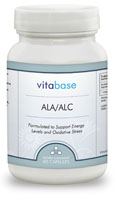
| Acetyl L-Carnitine | 525 mg | * |
| Alpha Lipoic Acid | 225 mg | * |
|
What is AcetylóL ĖCarnitine? On the most basic level, L carnitine enables the energy producing component of our cells, the mitochondria, to do their job. The heart and skeletal muscles canít function optimally without it. With it, the heart can function at a much more efficient level. It isnít unrealistic to say that optimal supplies of L-carnitine could help ward off a significant amount of the human suffering that comes about when the heart deteriorates. In the skeletal muscles, sufficient supplies of L-carnitine can relieve the fatigue that may discourage us from improving our health through regular exercise. L-carnitine also has a pivotal role in weight management. Excess weight is a precursor to the most common debilitating diseases, and can shorten our life span, any nutrient that can help with weight loss is extremely valuable.† Acetyl-L-carnitine is a specific form of L-carnitine that crosses the blood-brain barrier and can slow mental decline and aging. In addition, it reduces risk for diabetes and mitigates diabetic neuropathy, a life-threatening complication of the disease. Conditions that L-carnitine has helped to improve include: ∑ Aging ∑ Heart attack ∑ Heart failure ∑ Angina ∑ Diabetic neuropathy ∑ Insulin resistance ∑ Intermittent claudication ∑ Alzheimerís disease ∑ Parkinsonís disease ∑ Muscle weakness ∑ Exercise-related fatigue ∑ Chronic fatigue syndrome and fibromyalgia ∑ Deficiency resulting from a vegetarian diet
(taken from the booklet Userís guide to Carnitine and Acetyl-L-Carnitine by Vera Tweed)††††††††††††††††
What is Alpha Lipoic Acid? It is a naturally occurring fatty acid found in each cell of the body. ALA works on the cellular level to help produce energy. To do this, it acts as a coenzyme, a helper of enzymes, in the cellís major energy cycle. As a coenzyme, ALA takes part in a multienzyme process preparing the fuel for the mitochondrion, the powerhouse of the cell. This energy is needed in the normal functions of our body. It takes glucose (blood sugar) and converts it to energy. It is a powerful antioxidant and has the ability to function in water and fat solutions which are unique in that vitamins C & E work in one or the other. It also has the ability to recycle vitamin C and glutathione after they have been used. Glutathione is a powerful antioxidant which has the ability to destroy free radicals. Another one of the benefits of ALA is the fact that it can cross the blood/ brain barrier. This is very important in that it can work on preventing free radical damage in the brain. Alpha Lipoic Acid may improve blood sugar control, so people with diabetes who are taking medication to lower blood sugar, such as metformin (Glucophage), glyburide (DiaBeta, Glynase), should only take Alpha Lipoic Acid under the supervision of a qualified health professional and have their blood sugar levels carefully monitored. |

